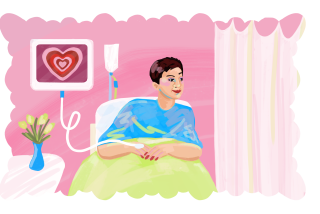Alone at Life’s Last Stop
- Share via
The man’s name was Charlie. He was 92. His body was betraying him; his mind was painfully sharp. Cancer, the charts at the convalescent home said, complicated by coronary disease, respiratory dysfunction, anxiety and depression. They could just as easily have said: Extreme illness, complicated by terror, loneliness and loss of heart.
When Richard Smith met him--summoned by hospital staff because the elegant man with the snowy hair couldn’t stop weeping, couldn’t stop worrying that he would die before his beloved wife, who had Alzheimer’s, who, you didn’t understand, was so afraid of being alone--Charlie was on a respirator. He was, he told the psychologist, at life’s “last stop.”
This was 1996. It happened to be in Atascadero, where Smith practices, but it could have been in any nursing or board-and-care home anywhere. Such places are full of people like Charlie, people too old or disabled or mentally ill to do what you or I would do if grief came to claim us--whatever it took to make ourselves well.
Charlie told Smith--”Smitty,” as the elderly man came to call him--about the disease, the fear, the promises he’d made to his wife not to abandon her by dying first. The veteran therapist listened, and asked Charlie to imagine two options: letting go and asking his wife’s forgiveness, or channeling this anguish into a here-and-now worth having. Death or life. It was Charlie’s choice.
*
As noted, the state has thousands of people like Charlie, whose health, in these nursing and board-and-care homes, has been entrusted to Medicare. Some are elderly, some are disabled, some have the kinds of mental illnesses that, with inadequate treatment, consign them to helplessness. All face stresses that either can worsen their conditions or be eased with effective psychotherapy. In the year Charlie met “Smitty,” these people became the focus of the Medicare bureaucracy.
At the time, the southern half of California had only about 5% of the nation’s Medicare caseload, but was generating something like 20% of its psychology bills. Some of the disparity had to do with L.A.’s slightly more open attitude toward mental illness, but quackery also had been unearthed.
So Transamerica Occidental Life Insurance Co., the sector’s Medicare carrier, brought the hammer down. Good therapists welcomed the scrutiny at first. But as the charlatans fled, the hammer began to hit people whose care-giving mattered. And the crackdown acquired a life of its own.
*
Three months after Charlie began therapy, he was off the respirator and asking Smitty if they could meet outside, in the sun. In that mysterious way that the mind coaxes the body, the cancer slowed; when Charlie’s wife died, he was holding her hand.
He saw the therapist off and on for two years until his death last summer. (“Dr. Smith has helped me over some very sad and difficult times,” he wrote at one point to Medicare.) Though the visits were weekly, Smith, like many visiting nursing home therapists now, only billed during emotional crises, and then only for two visits a month. Compared to respirators and hospital stays (and the going rate for private therapy), the money involved was a pittance--$28 a session. Payment was denied.
This was not a glitch. Across the southern half of the state, competent psychologists report the same story: near-routine denials for treatment that is later found to be necessary, if they have the time and money to appeal. Though Transamerica’s share of the nation’s mental health payouts--that 20% figure--has been slashed to 8.3%, roughly one claim in four for talk therapy in nursing and board-and-care homes still is being denied.
This would be fine if these places were still full of bad apples, but they aren’t. Fewer and fewer therapists, good or bad, will even take Medicare patients anymore. Those who have remained--to be treated like public enemies--include some of the area’s most dedicated and effective practitioners.
You’d think the insurers would declare victory and let the helpers help now, but they haven’t. Why should they? People in these homes don’t complain. They just endure, which makes the wrong that much worse. To touch mental health is to touch the difference between mere existence and a here-and-now worth having. The denial of treatment to those who yearn just to feel human, just to get clear of the anguish, is not only a health issue. It’s a moral crime.
If psychological pain were diabetes or asthma, some ailment we weren’t afraid to understand and tackle, we’d do whatever it took to keep the best and the brightest from leaving the system, to give sufferers health. Instead, we crack down on society’s voiceless. This is our choice, over being well.
*
Shawn Hubler’s column runs Mondays and Thursdays. Her e-mail address is: shawn.hubler@latimes.com
More to Read
Sign up for Essential California
The most important California stories and recommendations in your inbox every morning.
You may occasionally receive promotional content from the Los Angeles Times.













